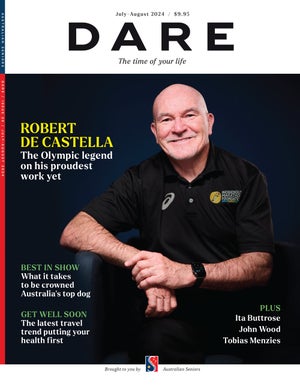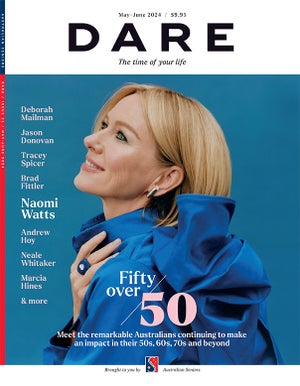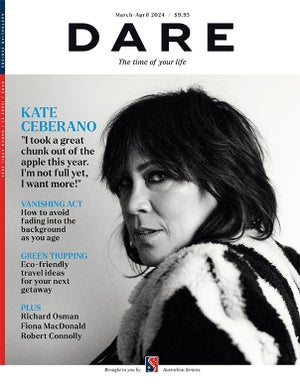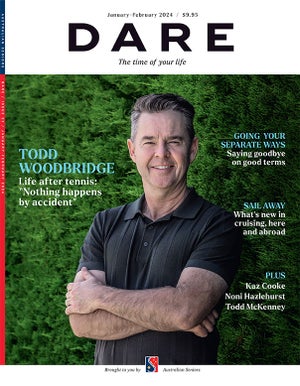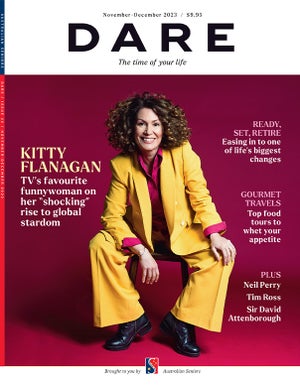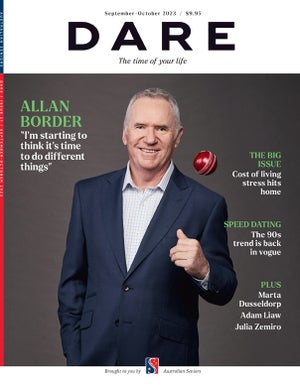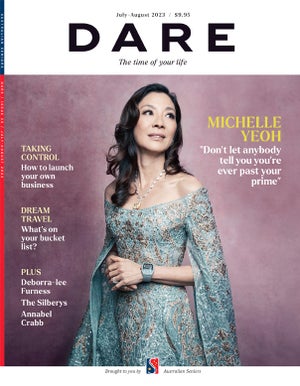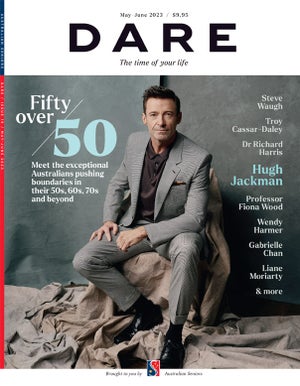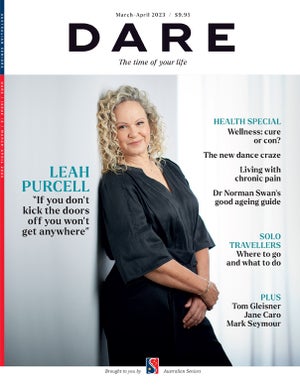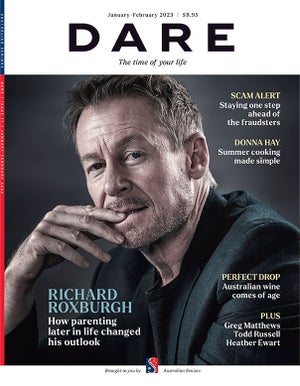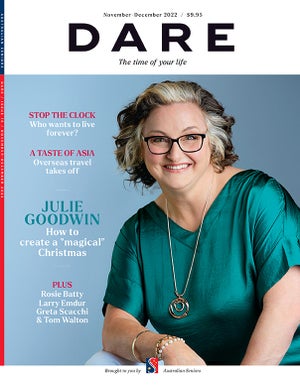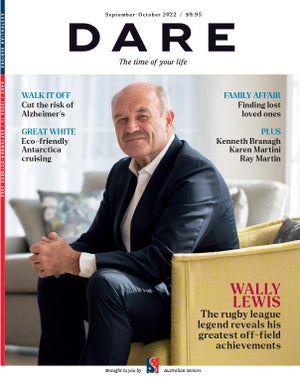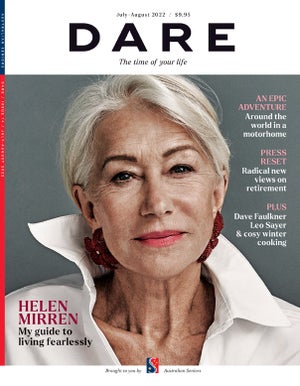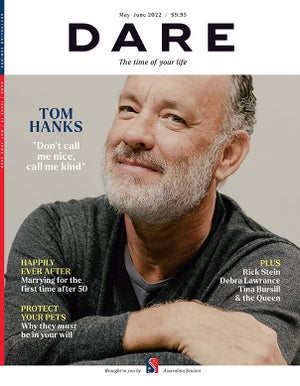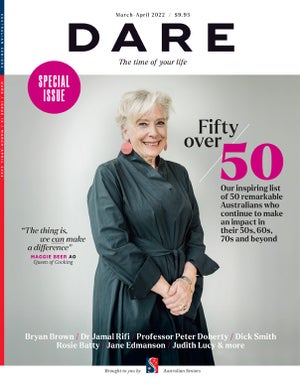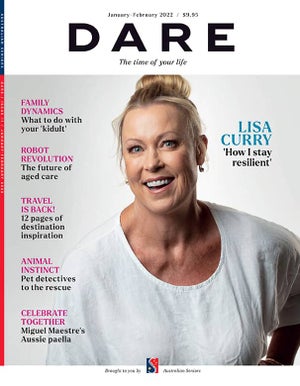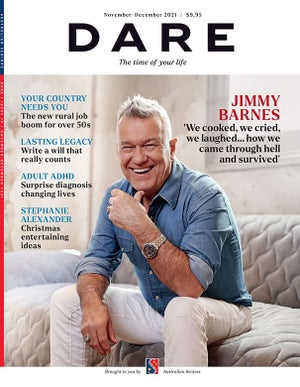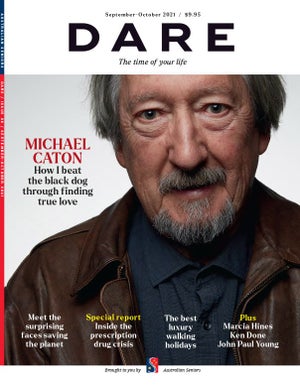DARE magazine
DARE is your bi-monthly reminder to embrace the world around you. Go beyond the page and discover a new you.
Open a world of new ideas
To dare means to exceed your potential – to be more than you thought was possible. Whether it’s the pursuit of knowledge, an itch for inspiration, or a never-ending desire to break barriers, DARE magazine is your first step to a world of new ideas.
Get the latest take on trending issues, smart tips to boost your financial goals, or a fresh way to indulge in everyday joys, all from the comfort of your favourite reading spot. DARE also features exclusive stories from some of Australia’s favourite personalities.
Why did I receive a copy of this magazine?
Stories that go beyond the page
DARE is the magazine for more than just readers. It’s your bi-monthly reminder to connect, explore, and indulge in the journey you’re on. Don’t just read it – DARE it.
Discover
What's new and trending? We present snippets of the latest products, news and research, all designed to inspire, excite and improve your life.
Explore
Go beyond the normal and into the new. Discover the world, and yourself, with travel tips, career pathways, emerging technology and more.
Plan
Life is easier when it goes as planned. We tackle the daring questions to help you carve the way to success.
Indulge
We’ll show you how to make the things you love even better or help you find your new favourite pastime.
DARE to take a sneak peek?
Johanna Griggs
![]()
Johanna Griggs, the star swimmer turned host of Better Homes and Gardens, is certain she has found the perfect recipe for living her best life over 50. Here she shares her insights, including how she maintains her closest relationships and discovers new hobbies and passions through filming her hit TV show.
Treasured TV presenter Johanna Griggs was a wide eyed teenager with a promising swimming career when she was dealt a life-changing reality check – its ripple effects still affecting her to this day.
“It’s the period of my life that I reflect upon the most and I’m most grateful for,” says the 52-year-old host of Better Homes and Gardens, who, at the age of 17, was knocked flat by chronic fatigue syndrome and forced out of the pool, her dreams of bettering her 100m backstroke bronze medal at the 1990 Commonwealth Games in tatters.
The devastating health diagnosis – which would take “years” to recover from – could have been a disaster, but Johanna saw the situation as an opportunity and began re-evaluating her future from her sick bed.
“It was realising that everything I thought was going to be there forever, wasn’t going to be there forever,” she admits. “I had to redefine myself. I had to find all those things that would actually fulfil me, what was important to me.”
Tour de force
![]()
Think group tours are all bus queues and regimented itineraries? Think again. Today’s tour operators are offering over 50s travellers the perfect blend of structure and freedom, convenience and adventure.
If your last experience of a group tour was aboard a Contiki bus packed with enthusiastic young travellers, you will be surprised at how guided tours have changed. Now targeted at a more discerning traveller, group travel today is “far more sophisticated” according to Lesley Owen, group general manager of MTA – Mobile Travel Agents. “Think intimate group sizes, exclusive access to experiences you simply can’t arrange yourself and expertly curated itineraries that balance structure with flexibility,” she says.
Small group travel, including small-ship cruising, is also proving popular not just with solo holidaymakers, but also among experienced travellers who are ready to outsource some of the planning. “Our clients want enrichment, not exhaustion,” Lesley says. “They appreciate having the logistical details handled while enjoying personalised experiences, giving them the confidence to explore the world without the stress of planning every detail themselves.”
Migraine breakthrough
![]()
New medications are giving millions of people living with migraine their lives back, but access in Australia remains patchy. Here’s what is available, who can get it, and why there is more reason for optimism than ever before.
I was 41, desperately deprived of sleep and five months postpartum when I had my first migraine. It hit on one side of the head, I could barely keep my eyes open and it didn’t respond to any ‘normal’ painkillers. Eleven years on, I manage between five to seven migraine attacks a month with rescue meds, and, like the one in three women who suffer from this often ‘invisible’ condition, hope to one day be migraine-free.
Luckily, there’s more hope than ever for those living with the debilitating condition. “In the last decade we’ve seen a generation of new medications,” says Dr Jason Ray, neurologist and headache specialist at The Alfred Hospital. “We’re also getting better at conducting research, there’s more interest in migraine, and while we’re not where we should be yet, things are improving.”
Michael Hussey
![]()
Following the traumatic premature births of his two youngest children, the cricket great has dedicated the last decade to raising awareness and much-needed funds for charities close to his heart.
There’s a reason Michael Hussey is known as ‘Mr Cricket’. Not only is he one of our greatest exports, with a career spanning domestic cricket in Australia and England, playing for two teams in the Indian Premier League and representing Australia in tests, T20s and ODIs, but he’s known for his encyclopedic knowledge of the game as a coach and commentator following his retirement in 2016.
Michael is also one of the most modest people you’ll ever meet, and the 50-year old admits he struggles to feel worthy of the many accolades heaped on him.
“I mean, you can be called a lot worse, I just didn’t love [the nickname] because I didn’t think I deserved it,” he tells DARE. “I love the game, but there are so many better players than me out there, and there are so many more people out there that know more about the game than I do.”
Keeping it all in the family
![]()
Can you really work with family without it ending in tears? Lisa and Isabella White did, transforming a heritage building into Miss Midgley’s boutique hotel, and learning the value of communication and collaboration along the way.
We've all heard the tropes, “Don’t mix business and pleasure” and “Never work with children or animals”, but when it comes to working with family members, what are the rules? Plenty of people do it – some successfully and others not so – but is there a right and a wrong way to go about it?
For mother and daughter Lisa and Isabella White, collaborating on Miss Midgley’s boutique hotel – a 160-year-old property they bought and painstakingly restored in Brisbane’s New Farm during COVID that not only pays homage to the building’s heritage but is one of the city’s most sustainable properties – having a strong foundation and open communication was key. “Isabella and I have always talked, if not every day, we talk nearly every day,” says Lisa, 63. “Then we did this project and it just flowed on in the normal run of how we were – though it was decidedly more intense.”
“I’d actually put us in the category of super communicators – there is no topic that is too difficult in our family,” adds Isabella. “That also bleeds over into when we were working together, which is probably why it made it so easy, because there was nothing that you couldn’t say to one another where you were afraid of hurting someone’s feelings or you thought it wasn’t a safe space to be able to put [forward] an idea.”
When the Aussie battler needs a hand
![]()
The ‘don’t make a fuss’ attitude might be part of the Australian spirit, particularly for older generations, but when it stops people accessing the help they need to stay independent at home, it’s time for a gentle conversation. Here’s how to start one – and what new support is available.
Australians are proud of the Aussie battler archetype – the person who ‘makes a go of it’ despite the obstacles. Their prevailing traits of working hard, quiet determination and resilience in the face of adversity are all admirable, but it’s also resulted in a post-war generation of older Australians who have a ‘don’t make a fuss’ mindset.
This means they’re less likely to ask for help when they need it and are more likely to dismiss offers of assistance, even when it makes ageing at home far easier. Patricia Sparrow, CEO of COTA (Council on the Ageing), says that older Australians’ reluctance to ask for help is a common reaction when their ability to remain fully independent is called into question.
“We all like to be as independent for as long as we can be, so putting your hand up to say that you need help can be hard for people,” says Patricia. “There are supports to help people stay at home, but the idea behind them is that they help you to maintain your independence.
From hobby to empire
![]()
They may look like playthings, but certain toys and collectables are proving themselves as surprisingly savvy investments. As they surge in value, experts reveal what separates profitable passion from costly obsession.
When COVID hit, Sean McConville found himself building Lego. While mourning the recent passing of his wife, Sean had left his job in the corporate world to spend time with his teenage sons before the era of lockdowns began.
“We just started dragging out all their old Lego from when they were kids and started building it,” he said. They started selling old sets on eBay in order to buy new ones. “Some of the used sets that we rebuilt were worth more than at the time we bought them,” he says.
After doing some research, Sean, 52, discovered the world of Lego investing. “I started buying a whole bunch with the idea that maybe I could create a bit of a side hustle selling Lego,” he says. “I just kept accumulating. I watched the value of it grow over time and then I got a storage unit. It started to get to the point where it was several hundred thousands of dollars’ worth of Lego.”
He decided to open a pop-up store, with the aim of making $15,000 a month. “By the third month, we tripled that monthly sales,” he says. “So I hired somebody, and we extended the lease for another six months. Now we’ve got three fulltime staff, two casuals, and we’re turning well over six-seven figures.
“Our store Brickville has grown into potentially the biggest seller of rare, retired and hard to-find Lego in Australia.”
Guy Pearce, 57
![]()
During much of his acting life, Guy made an effort to rid himself of his first character, that of Mike Young in Neighbours. “I was in Neighbours for four years. I played the same thing and it drove me nuts,” he told GQ recently. “I don’t know how much of [my subsequent career] was a backlash to that.” Indeed, the actor has since made bold choices when it comes to roles in movies such as Memento and The Adventures of Priscilla, Queen of the Desert, and TV shows like Mare of Easttown. However, in 2022, the actor revisited Mike in what was meant to be Neighbours’ finale, and then appeared in the rebooted series before saying a final goodbye in 2024.
Of course Guy has had a long and lauded career post Ramsay Street and this year his film The Brutalist saw him honoured with his first Academy Award nomination, as best supporting actor. “I stop and go, ‘Wow, that’s really happened?’” says Guy, who was also nominated in the same category at this year’s Golden Globes, BAFTAs and Critic’s Choice awards, and additionally picked up an AACTA nomination for his lead role in period film The Convert.
Guy, who is based in the Netherlands bringing up eight-year-old son Monte with his Dutch ex-girlfriend, also continues to make Australian TV, including recent miniseries The Clearing. “The thing you’re supposed to want is to be a big American movie star, which I absolutely see all the benefits of. People would say, ‘Yeah, but if you do this thing, then you can choose whatever you want.’ I’m like, I’m already choosing whatever I want.”
Claudia Karvan, 52
![]()
Blossoming from adorable child actor to a powerhouse of stage and screen, Claudia is one of Australia’s most recognisable faces. Audiences have followed her through share houses in The Secret Life of Us, to painful motherhood in Love My Way, and now middle age in hit Stan series Bump.
Sydney-based mother-of-two Claudia was co-creator and producer of the comedy drama, which wrapped its fifth and final season last year, and now has a movie in production, Bump: A Christmas Film. “The thing I’m most proud of is that I didn’t have to leave home,” she recently said about her decision not to head to Hollywood. “I got to work in my own city and it meant we were able to have a very consistent, reliable family life.”
The only thing she could wish for now is a time machine. “I could never have predicted to be enjoying my career as much as I am now. If only I could go back in time and just talk to my 20-year-old self when there’s so much pressure, particularly as an actor, like this is you at your peak, it’s all downhill from here. And it’s not been like that at all.”
Darren Hayes, 52
![]()
It’s hard to imagine what it’s like having your songs become synonymous with an era, but for Darren, that’s the reality. As half of Australian pop duo Savage Garden, along with Daniel Jones, he was responsible for hits such as Truly Madly Deeply and I Want You, that helped define late 1990s pop. The pair topped the US Billboard charts, as well as the Australian music scene.
However, while it looked enviable from the outside, Darren was far from happy. “I was completely confused about my sexuality and I probably hated myself,” he recalls in his 2024 memoir Unlovable. But after the new millennium arrived he took steps to increase the joy in both his personal and professional life, coming out as gay and launching a solo career.
Two decades later, you only need to look at the title of his most recent album, Homosexual, to see just how far he’s come. “It’s my most proudest achievement,” he writes. He can now also cherish being part of music history. “I feel privileged to be a guardian of the memories that fans have attached to these classic songs. I just seem to be very resilient and I love that about me.”
Bob Brown, 80
![]()
As young and old join his fight to rescue our planet from the bulldozers and chainsaws, the mining giants and criminal polluters, octogenarian environmental warrior Bob has a message for his recruits: “It’s important that we have fun and enjoy what we’re doing, even as it looks so daunting and the statistics are so dreadful about what humanity is doing to itself and to the planet,” he tells DARE.
The former Australian Greens leader channels his efforts through his Bob Brown Foundation, which campaigns to protect the world’s natural resources. “I enjoy being able to take on the politicians and corporate entities who say that we can’t change direction when we can. In World War II – which many seniors would still remember, I was born during it – we diverted 15% of our economy in a few months to the war effort. Well, we only have to divert 1 or 2% of the economy worldwide and we could stop climate change and its actions. But we won’t do it because there is so much greed and self-interest and short-sightedness.
“So it’s our job to turn that around. And I enjoy every day being on the side of history that’s going to help change the planet.”
Melanie Jones, 52
![]()
Former Australian cricketer Melanie has won World Cups and Ashes series and is now a global cricket commentator and director of JET Group International, which empowers women in sport. “As a kid my goal was to replace Allan Border on the Australian men’s cricket team as I had no idea there was an Australian women’s team or that women even played,” she tells DARE. “My first time seeing the Australian women’s team play live was at the MCG and it was easier counting the crowd than the seagulls on the field. I’ve gone from there to working at the T20 Women’s World Cup at the MCG with 86,174 people in attendance.”
Melanie has also seen a huge shift in attitudes towards women’s cricket in the commentary box. “My first commentary experience had me vowing never to do it again. On the whole there is a wonderful collegiate feel now, with a genuine appreciation for the skills and talent of world class cricketers.”
Off the field, she works hard to promote equality in sport. “Cricket being an international sport with a broad range of ethnicities playing it, means we can use it as a common ground to start bridging some socially constructed divides.”
Guy Simpson, 67
![]()
From Evita to My Fair Lady and Guys and Dolls, musical director, conductor and orchestrator Guy has covered them all in his 45-year career. “Ask me to pick a favourite and I just can’t do it,” he tells DARE, saying he loves the "complexity" of West Side Story, the "epic nature" of Miss Saigon, and the joy of working with legends like Tina Arena, Rufus Wainwright and musical royalty Julie Andrews. “My wife loves telling the story that Julie Andrews came to dinner and sang me happy birthday. That was pretty special!”
Refusing to contemplate retirement, Guy says he now has the “great privilege” of being able to choose his assignments. “I’m quite enjoying not performing eight shows a week and doing more developmental work with talented young collaborators like Jack Earle. It’s exciting seeing really skilled young people and to know musical theatre is in good hands.
“For something like Guys & Dolls, which we did for Opera Australia earlier this year, the story is epic and there is nothing wrong with the original score, but when you’re putting it on on Sydney Harbour with the fireworks and everything, it’s great to say, ‘Let’s gee it up a bit!’”
Scott Williams, 75
![]()
Scott’s philanthropic journey began serendipitously 30 years ago when his flower delivery business in Armidale, NSW, shared office space with the Smith Family. Initially, he was donating Christmas hampers but after he learned about disadvantaged children’s school dropout rates, some as young as six or seven, he was determined to help. “You know the saying, teach a man to fish and you feed him for a lifetime,” he tells DARE. “If these kids stay in school and go on to a local university we can break the cycle of poverty. From a business standpoint, it’s the greatest return on investment.”
Since then, Scott has sponsored more than 1,540 school-aged children, assisting in everything from school supplies to rent payments. He also launched the Scott Williams Foundation to help students thrive during university and beyond, and has so far sponsored 472 university students across five universities.
Now he has set his not-for-profit sights on business mentoring in Noosa with the establishment last year of MentorSME. “Evidence shows that people who study in regional towns will stay working in regional towns, provided they get the right support. We want to bring in more business opportunities and generate more prosperity for regional communities.”
Dr Marguerite Evans-Galea, 54
![]()
When she applied for her first job as a pharmacy assistant, esteemed scientist Dr Evans-Galea declared she wanted to “save lives and contribute to the greater good”.
“What’s wonderful is that it remains true to this day,” she tells DARE.
Now world-renowned for her research into cell and gene therapies for inherited diseases, she adds: “What I do, I do with the goal of helping our society and making a difference, and it’s more compelling now than ever before. Innovative cell and gene therapies are at the forefront of science, transforming healthcare, giving hope and improving people’s lives. These are immensely exciting therapies because they have curative potential.”
Director of Australia’s Cell and Gene Catalyst and passionate about diversity and inclusion in her field of STEMM (science, technology, engineering, mathematics and medicine), she says rapid technological advances mean that STEMM skills are becoming a core requirement for most jobs in the future. “For Australia to do the best research and successfully innovate to navigate the challenges we are yet to face, a diverse range of ideas, talent and expertise will be required. We need to see STEMM leaders from different backgrounds and lived experiences as the norm, providing role models to inspire the next generation.”
Brian Edward, 84
![]()
A Lions Club member for 47 years, former police chief superintendent Brian has always been invested in the future of Australia. “Since my early days in policing in Melbourne in the 1950s, I believed that well supervised youth clubs and adventure style camp opportunities were ways to deter children from participating in antisocial behaviour,” he tells DARE. “That is still my belief.” But it wasn’t until he retired in 2002 that Brian was able to put that belief into first gear, becoming the children’s camp coordinator at Lions Club Geelong Corio Bay.
He usually accompanies 120 children each year to Lions-sponsored outdoor activity camps. But it is his fundraising – over $400,000 over 23 years – that has enabled more than 1,300 disadvantaged and refugee children to join in the fun. “His skills in writing to trusts and other philanthropic entities is legendary,” says Lions Club event organiser Colin Anderson.
Awarded an OAM in 2021 and named a Westfield Local Hero in 2023, not even a brush with death has been enough to deter him. “In June I collapsed in my home following a cardiac arrest. But I survived!” Just two weeks later he was back playing tennis. You can’t keep a good man down.
Charlie Bass, 75
![]()
Mining entrepreneur and the 2024 Western Australia Senior Australian of the Year, Charlie believes that business and government interests in his state have been focused on “feeding one golden goose” – the resources sector – “at the exclusion of almost everything else”. So after a $1.4 billion takeover of his company Aquila Resources in 2014, he decided to encourage diversification into other industries by launching the Centre for Entrepreneurial Research and Innovation (CERI), to give budding entrepreneurs a guiding hand and financial backing.
“We have a lot of high knowledge workers in many fields who are key to creating the sustainable, high value, export-oriented industries of the future,” he tells DARE. “CERI was designed to help these kinds of people see for themselves what they are truly capable of doing.”
Innovators like infrastructure monitoring company Terra 15 and biotech startup Lixa, among others, are now being mentored by CERI, with funding primarily coming from the Bass Family Foundation. “I feel so proud of our CERIans, almost none of which were born with silver spoons in their mouths. They all want to make a positive difference to society. To see someone create their own path and accept the challenges that come with it is very rewarding to me.”
Professor Melissa Little, 61
![]()
Ten years ago, Professor Little looked down her microscope and spied kidney nephrons growing. “It was one of those ‘Oh, my gosh’ moments that I don’t think I will ever forget,” she tells DARE. She went on to produce the world’s first kidney in a dish, a regenerative therapy breakthrough promising hope for the one-in-10 Australians affected by kidney disease.
The stem cell biologist has spent the intervening decade expanding on her groundbreaking work at the Murdoch Children’s Research Institute, and currently runs a global stem cell consortium, developing therapies across Denmark, Australia and the Netherlands. “In the tissue engineering space, we have gone from the impossible to the possible. We are working towards a product that may be able to reach a first in-human clinical trial in the coming five to 10 years. I certainly would love to see this happen during my career.”
Professor Little, who was made an AC in the 2023 Honours List, says science makes her look at things differently and imagine new approaches. “This is made even easier in stem cell biology because what we do is so beautiful. My family would say I have a pathological work ethic. My science is a passion that can sometimes consume me.”
Mariam Issa, 56
![]()
In Mariam’s homeland Somalia, the gift of oral storytelling is handed down to provide a building block for society. Now she has brought that proud tradition to Australia where her visionary storytelling skills, blended with her African heritage and Islamic beliefs, have given her a new direction as a life coach, author, community builder and educator.
“I think I’ve always been a storyteller but it took me a while to realise that,” she tells DARE.
“It can be incredibly powerful in that it touches people’s hearts and shows them a way in which they can be more humane with each other. It can also empower communities and give women the chance to reclaim their voice and dare to change the narrative to bring more kindness and compassion into the world.”
Mariam came here with her family as a refugee after fleeing war in her homeland, and started getting to know people by planting a community garden and holding workshops and women’s groups. “My mission is to help others discover and harness their capabilities and allow them to contribute to their community. And while I’m a storyteller, it’s also very important to listen because then you are giving a voice to others.”
Claude Lyle Harvey, 79
![]()
When retired landscaper Claude saw a news story on TV about vulnerable children, he leapt out of his armchair and onto the nation’s highways and byways, pushing his trusty lawnmower thousands of kilometres, intent on publicising the problem of abuse. For the last 15 years, ‘The Mowerman’ as he’s affectionately known, has been trundling around the country campaigning for kids’ safety and raising money for child protection charity Bravehearts, with locals flocking to make donations when they see him coming.
“There might come a point where I can’t do this anymore, but I’m not there yet,” he tells DARE. The Gold Coast-based grandfather, who was awarded an OAM in 2019, has raised more than $1.9 million for the charity so far. “I’m now only $83,000 off my aim of $2 million, so I’ll just keep going,” he explains.
Claude lost his wife in 2023, so he says he now has even more time for his mission. “There’s still a lot of abuse going on and if I can save even 10 children in my lifetime, then it would be worthwhile. But if I can save 1,000, then that’s even better!”
Barbara Jones, 80
![]()
The winner of the 2024 NSW Senior Volunteer of the Year, an award proudly sponsored by Australian Seniors, Barbara has been helping others for a lifetime. From shopping for her neighbour as a child – “I don’t know how that came about but it just seemed quite natural,” she tells DARE – to a long association with Meals on Wheels, she’s always giving her time where it’s most needed.
A member of the 3Bridges volunteer home visiting service, Barbara now offers support to mothers struggling with their newborn babies. "They might have postnatal depression, they might have no family nearby, they might be from overseas or interstate – consequently they have a difficult time coming to motherhood. Sometimes it’s as simple as saying, let’s go out and we’ll do the shopping together.”
Also volunteering with organisations like Bushcare, Wrap With Love, Sutherland Food Services and the Cancer Council, Barbara says that caring for others is just part of who she is. “I can’t stand people being alone, can’t stand people being hurt. I have had a bit of a sad life, and I think it’s made me extremely resilient and makes me care about people. I can’t stand anybody else going through something I’ve been through.”
Madeleine Jaine Lobsey, 50
![]()
A world in which everyone has the chance to work, rest and play as absolute equals and sees their own unique brilliance recognised and respected? That is the mantra for Madeleine, who has dedicated her life to giving neurodivergent people the same opportunities and social support as their counterparts. “I think there’s a really incredibly diverse community of people out there,” she tells DARE. “And many of them are extraordinarily gifted but need a little extra thought to be able to make the best use of their talents.”
At the age of eight, Madeleine – who’s proudly autistic/ADHD herself – came up with the idea of setting up a business called Wondiverse, and since 2023 she has made it a reality. It’s an organisation creating chances for all neurotypes to work and play together by adapting workplaces to make sure everyone can function in them just as well, and hosting events where no-one is at a disadvantage.
Recently, for instance, she led a ‘Build the Future’ event using Lego to build a city in partnership with the Western Sydney International Airport, with participants of all neurotypes and ages. “We had a 79-year-old man, down to young autistic kids,” she says. “It was fabulous.”
Glenys Oogjes, 69
![]()
For more than four decades Glenys has been at the forefront of animal welfare activism, fighting for justice for all our “sensitive fellow beings” as CEO of Animals Australia and also on the board of the World Federation for Animals. Leading sustained and successful public crusades to end battery hen farming and live sheep exports, the 2024 Victorian Senior Australian of the Year admits there’s still much to do.
“I can continue because I can see the huge potential provided by a growing crop of amazing advocates with new tools and skills,” she tells DARE. “I know the path ahead is smoother than I experienced in the early days. Our community is on the brink of a much higher and more compassionate consciousness than we have seen in past decades.”
With advocates needed to put the spotlight on puppy farming, greyhound racing, recreational duck shooting and the commercial killing of kangaroos, Glenys advises new animal campaigners to “learn all you can about the issues you wish to influence”. “People are inherently kind and compassionate and would not ever knowingly harm animals. So the way forward is to provide the insights, inspiration and support needed to help people towards kinder choices.”
Miranda Otto, 57
![]()
For nearly four decades, Miranda – who hails from an acting dynasty – has captivated audiences on both big and small screens with her chameleon-like ability to portray everything from a witch in Chilling Adventures of Sabrina to a cult leader in The Clearing.
Twenty-two years after her character Eowyn was introduced in the second film of The Lord of the Rings trilogy, Miranda reprised the role, this time as a narrator, in animated film The Lord of the Rings: The War of the Rohirrim.
“We left Middle Earth all those years ago, and then we were never able to come back,” she reflected ahead of the film’s release last December. “So it was like this extraordinary opportunity to revisit that really wonderful time in my life.”
She also starred in last year’s ABC TV series Ladies in Black, and was again directed by sister Gracie Otto, having worked together in 2023’s The Clearing. “It’s such a pleasure to be directed by someone a second time,” Miranda says. “They’ve already directed you before, so you already feel like there’s trust, a shorthand, no matter whether it was my sister or not. I love that Gracie keeps a really great energy on set.”
David Martin, 76
![]()
Having notched up 21 years of service in the Army, including a post in Vietnam, David now dedicates himself to honouring veterans and serving the needs of his community. “There are still about 13,000 Australian veterans lying in dirt plots with nothing on their graves,” he tells DARE. “So, I try to help honour those people by commissioning war graves and different memorials.”
Last year, he helped install a statue of a special forces soldier in the memorial park in Rutherglen, Victoria, recognising residents who served in conflicts post-Vietnam. “It’s very rewarding to look around the park and see my stamp all over it,” says David, who has served continuously in the RSL since 1969.
He’s also spent 38 years with the Murray Valley Centre, a day training centre for people with disabilities. Although David will be stepping back from his current role as CEO, he remains dedicated to supporting the centre and ensuring its impact continues. “It’s been challenging at times, but I’ve loved giving a sense of community to people who need it. No matter what age you are, we all need a connection to our community.”
James Allsop, 72
![]()
Presiding as chief justice of the Federal Court of Australia during the pandemic, James witnessed how technology could assist the law and benefit marginalised sectors of society. With courtrooms closed across the country, digital tools enabled the courts to continue to hear almost all cases that didn’t require the physical presence of all parties (for example, criminal jury trials), with participants dialling in remotely from offices or homes.
“The ability to put in place and maintain this dispersed system of justice gave many insights,” he recently explained. “That a court could, systemically, continue to operate using digital technology for communication, that access to justice could be given to people in remote locations; that disadvantage of those without resources could be overcome by the court itself providing communication facilities in its premises, and many others.”
Since retiring in 2023 after 10 years as chief justice, he now provides arbitration, mediation and expert legal services. And he actively encourages courts and lawyers to embrace tech like AI that could assist them in processing large volumes of data with “speed, growing accuracy and lowering cost”. “If public justice is to remain relevant it must incorporate and give confidence and validity to these tools to improve access to justice.”
Mechelle Turvey, 58
![]()
Australia watched in horror as Mechelle delivered a powerful speech calling for non-violence after her son Cassius, a Noongar Yamatji teenager, was allegedly assaulted on his way home from school in 2022, dying 10 days later in hospital. The 15-year-old’s death spurred Mechelle, an experienced Aboriginal liaison officer, to further advocacy and action. She is currently employed with WA Police, presenting training sessions on supporting victims of crime.
“My shared lived experiences have provided insight on navigating how to engage with [victims of crime] with empathy and caution,” she tells DARE. “Trauma and grief present differently in each person. The victim engagement training sessions I have successfully delivered to 400 new police recruits is something I am proud of. I have an opportunity to create positive change. I also want to spread the word that our youth are powerful. Give them a voice and pathway to use their power.”
Named WA Australian of the Year in 2024, Mechelle now takes one day at a time. “I don’t set goals as I have learnt that going with the flow is a better plan. Before, I felt that it was a socially acceptable quality to only be strong. But embracing all feelings and working through them is good grieving and healing.”
Dr Anne Summers, 79
![]()
In a life dedicated to campaigning for equality for women, feminist author, journalist and academic Dr Summers is never one to shy away from a challenge. Which makes her current mission researching domestic and family violence at the University of Technology Sydney, such a promising step forward for us all.
“Although government is making all the right noises and spending money, violence is as bad as ever,” she tells DARE. “We might be seeing less physical violence, but there’s much more coercive control, psychological manipulation, stalking and the use of technology to spy on women, which is harder to detect and prove. Domestic violence has a huge impact on women’s ability to work and study and one of the things that has to happen is that we have to get rid of violence generally.”
Sadly, even after more than 50 years of modern feminism – propelled in Australia by her 1975 classic book, Damned Whores and God’s Police – she says we’re seeing a big rise in the number of proudly openly misogynist men. “But on the plus side, young women are increasingly ready to speak out against it. They’re sticking up for themselves and asserting their rights. So I’m very optimistic.”
Greg Chappell, 76
![]()
Like many Australian kids, Greg’s love of cricket was forged in his backyard, over games with his older brother Ian, a fellow future star of the sport. With a five-year age difference, Greg was nine when his hero brother finally let him join in the ‘test matches’ he played in the garden with mates. “The lessons I learnt in that backyard about loving the contest and wanting to fight for my corner was a pretty important part of the make up of myself as an adult and particularly as an adult cricketer,” he tells DARE.
He went on to have an impressive career as Australian captain, before turning his hand to coaching. These days, Greg stays on the ball with his poignant cricket commentary in his regular Sydney Morning Herald column.
“I probably tried to divorce myself a little bit when I finished, but I’ve always been attracted back somehow. I enjoy the writing because it’s a creative outlet. It gives me the opportunity to use the knowledge and the experience that I’ve had from a lifetime in the game. There are skills I’ve learnt from cricket that are very applicable to my personal life, to my relationships, to just general life.”
Michele Bullock, 63
![]()
Michele has one of the most scrutinised jobs in Australia. As governor of the Reserve Bank of Australia, it’s her responsibility to raise, pause or cut interest rates to manage inflation and keep the country out of recession. “We want to bring inflation down in a way that doesn’t cause a spike in unemployment,” Michele has explained. “That’s the balancing act we are trying to get right, and it is a challenge.”
The economics graduate has worked at Australia’s central bank her entire career and broken many ‘glass ceilings’ during her time. She became the bank’s first woman assistant governor in 2010, and its first female deputy governor in 2022, saying: “This position is effectively the chief operating officer of the Reserve Bank, so you need to be across a lot of areas. And I have to say it’s also quite humbling to be appointed to this position.”
Now, as the first female governor – a role she has performed since September 2023 – she is committed to seeing more women follow in her footsteps. “We are doing a lot of work trying to encourage women to study economics, but it is a bit of a struggle. We need diversity, we need more women in economics.”
David Elliott, 67
![]()
The chance discovery of a dinosaur fossil on his sheep station near Winton, Queensland, in 1999 set grazier David on a new path. Today, many exciting finds later, he oversees one of the world’s most significant collections of Australian dinosaur fossils at the Australian Age of Dinosaurs Museum of Natural History, the attraction he co-founded in 2002 near Longreach that champions outback tourism, and supports a lively community of often older volunteers who stay onsite to prepare the fossil bones for display.
Last year he was named Australian of the Year Local Hero. “The win was pretty exciting,” he tells DARE. “Where it’s really valuable is it enables you to have access to important people who can help make a difference, particularly in government,” adds David, who is fundraising to rebuild the natural history museum as a major international destination.
“Australia has relevance on the world stage as its natural history evolved differently from everyone else’s. My passion is to build a museum here that will make a difference to the region, because towns in western Queensland and central Australia are really struggling to stay alive. We want to be the catalyst for local growth. People in the outback are very resilient and entrepreneurial.”
Professor Pat McGorry, 72
![]()
A psychiatrist, researcher and executive director of Orygen, Australia’s largest medical research institute for youth mental health, Professor McGorry has long been at the forefront of innovation in the prevention and treatment of mental illness. “Four decades ago, the treatments for depression, anxiety and schizophrenia were almost doing more harm than good,” he tells DARE.
His pioneering work defined what the early signs of schizophrenia looked like, changing attitudes and the severity of the illness. “Puberty is usually the time when mental illness ramps up, but if schizophrenia is diagnosed in the earliest possible stages with expert care and proper support to the family and needs of the patient, the risks of violence and harm evaporate.”
A former Australian of the Year (2010), he led the landmark publication of The Lancet Psychiatry Commission on youth mental health last year, calling for urgent global action. There is still much to be done, he explains. “It’s easy to blame social media for the 50% rise in mental illness in young people over the last 15 years, but the evidence points to more fundamental factors, like climate change and the state of the world. This is what we have to work on.”
Nicky Zimmermann, 57 and Simone Zimmermann, 60
![]()
From their start at Sydney’s Paddington markets in 1991 to Australia’s first billion-dollar fashion label, Zimmermann sisters Simone, the label’s chief operating officer, and creative director Nicky command serious heft in the business of fashion. With their elegant, flowing designs worn by everyone from the Princess of Wales to Beyoncé, you’ll find Zimmermann boutiques across Australia, the US, UK, Europe, China and the Middle East.
“We’re proudly Australian,” Simone says. “We are headquartered in Sydney, and our home country has shaped who Nicky is as a designer. But, as Australians, we admire the rest of the world, and we were always excited to work internationally. We felt we had something unique to offer.”
In 2023, private equity firm Advent acquired a majority stake in Zimmermann, with the sisters retaining minority ownership and continuing to run the label. Sources estimate the company was valued at $1.75 billion for the transaction, making it the highest ever valuation of an Australian fashion brand. Now they want to grow. “The new regions on the cards are Asia and the Middle East,” says Simone. “We’re currently focused on growing new product categories – our footwear, denim, jewellery and eyewear – which is a big point of excitement for myself as a designer,” adds Nicky.
David Williamson, 83
![]()
As arguably Australia’s most successful playwright, responsible for classics like The Club and Don’s Party, David understands what works on stage. “Theatre at its very best is enthralling,” he recently said. “I want people to experience that. I know it’s old fashioned and we should have pyrotechnics, but I still feel drama is about unfolding characters and conflicts and that’s what I try and do.”
David actually retired from the theatre in 2020 citing health issues and a need to make space for younger writers. But last year he returned with a host of new plays – including Aria at Sydney’s Ensemble Theatre, The Great Divide, which hit the boards starring Life’s Booming guest John Wood, and The Puzzle, which premiered in Adelaide.
Plus, this year a slew of his old plays are being revived. “The fact I’m still being staged 53 years after I started, and the fact that people are still coming in numbers to what I’m writing, is, to me, a minor miracle of survival,” he says.
And there is more to come in 2026, with David busy writing new work – something he says is addictive. “Once my health was good again I couldn’t give up the addiction.”
Margaret Reynolds, 83
![]()
Growing up as a girl of the 1950s, Margaret didn’t expect to be involved in national and international decision making. “But my mother and grandmother always encouraged me and probably influenced my ‘girls can do anything’ belief,” she tells DARE. It’s a credo she’s personified through her vast career. Originally a teacher, she was initially galvanised to use her voice politically to protest conscription during the Vietnam War (she’s currently the president of the Australian arm of the Women’s International League for Peace & Freedom).
Margaret entered local Townsville council politics in 1979, and in 1983 became Labor’s first female senator in Queensland, holding positions during her 16-year parliamentary career including minister for local government and the inaugural government representative on the Council for Aboriginal Reconciliation.
The lifelong activist, who was appointed an AC in 2023 for her “eminent service” to parliament, social justice, gender equality, Indigenous rights, local government and the community, continues working with non-government organisations and has never been shy to take on a cause. “People fear change but it’s important to recognise that the right kind of change benefits us all. I was fortunate to see challenges as good reasons to find a new way to overcome old thinking.”
Professor Graeme Clark, 89
![]()
At the age of five, the pioneer of the multi-channel cochlear implant – or bionic ear – was asked by his kindergarten teacher what he wanted to do when he grew up. “I want to fix ears,” Professor Clark replied. “She was very surprised!” he tells DARE. “But I was always motivated to help deaf people, as my father had a severe hearing loss and I knew how difficult it was for him.”
Eight decades later, he has revolutionised lives, after leading teams at the University of Melbourne to work out ways to diagnose hearing loss in young children, and how to bypass damaged parts of the ear to stimulate the brain. Along the way, he set up the first public cochlear implant clinic in the world at the Royal Victorian Eye and Ear Hospital, and today the Graeme Clark Institute for Biomedical Engineering carries on his legacy, bringing further advances in hearing, seeing and walking.
“My hope for the future is that in Australia these areas of clinical research will continue to grow,” he says. “In addition, that the not-for-profit Graeme Clark Foundation will provide help to disadvantaged people with loss of hearing in Australia and overseas and inspire people to see research as exciting!”
Wayne Bennett, 75
![]()
One of the greatest coaches in rugby league history, Wayne is also currently the oldest in the NRL. But rather than hang up his clipboard he has launched into a whole new challenge, returning to take charge of South Sydney Rabbitohs for the next three seasons in a deal worth $3 million.
The team had a disappointing 2024 campaign, but the role holds few fears for the super coach who is a seven-time premiership winner and recently helped set up the new Queensland Dolphins team. “Don’t worry, I’ve been through this before,” he told the club.
Wayne, who represented Queensland and Australia during his time as a player in the 1970s, and led the Rabbitohs to the 2021 Grand Final when he was last in charge of the team, was last year inducted into the NRL Hall of Fame. Explaining his inspirational approach at the ceremony, he said: “Have I been results driven? I probably haven’t been. I know it’s important but at the same time I have been driven more by the fact that I want to build clubs and give young men opportunities to experience what I experienced as a player and a coach and find out how good they can be.”
Christine Holgate, 61
![]()
Christine has made an impact at every company she has helmed. In her time as CEO of pharmaceutical company Blackmores, share prices increased from around $10 to more than $200, and in 2015 she was the first woman to be named CEO of the Year by The CEO Magazine.
As the first female CEO of Australia Post, Christine was modernising operations when she came under intense pressure – in parliament and in the court of public opinion – over executive bonuses. Even though she was eventually cleared of wrongdoing, she resigned. “After experiencing trauma, you can’t forget what happened, but you can learn from it,” she tells CommBank’s Brighter magazine. “When you go through an incident like that, it makes you more conscious of ensuring people feel respected and heard.”
Now group CEO at logistics company Team Global Express, Christine is tackling perhaps her biggest challenge to date: turning a transport business into a global leader in sustainability. “Heavy transport accounts for about 20% of carbon emissions,” she says. “So we’re conducting Australia’s largest trial of a heavy electric logistics fleet.” So far the trial has seen the equivalent of 60 trucks off the road every day, saving about 286 tonnes of CO2 per annum.
Aaron Pedersen, 54
![]()
This year Aaron celebrates three decades on Australian screens and stages. “Your career is about longevity. I am forever grateful for being able to do the things I want to do,” says the actor, who found international fame playing Jay Swan, a First Nations policeman in the Mystery Road series, including two films and a TV spinoff.
The Arrernte-Arabana man most recently appeared alongside fellow First Nations actor Leah Purcell in the TV show High Country. “That is what we get to do this generation, thanks to all the pioneers that went before us, who didn’t get to tell stories in this way. Now, we get to tell our stories in our way, through our eyes, and are sharing it with an audience who I truly believe have been hungry for it for a long time,” says Aaron, who will star in the play The Shiralee at the Sydney Opera House in October.
Aaron is also the primary carer for his brother Vinnie, and has been for the last 27 years, and insists his sibling, who has cerebral palsy, is part of any acting deal. “He’s in the contract,” says Aaron. “If you want me, you’ve got to take Vinnie as well.”
Melinda Gainsford-Taylor, 53
![]()
A World Champion gold medallist and three-time Olympian, sprinter Melinda is busy coaching and mentoring the next generation on Sydney’s Northern Beaches. “I love watching the kids improve, not to become elite athletes but to help them enjoy their sports or general activities more,” she tells DARE. “I’m lucky my coaching work provides the opportunity to encourage so many kids to keep active, particularly through the teenage years where participation can drop off.”
Melinda is also passionate about her charity work. “I’ve been involved in the Can Too and Can Assist charities, which raise funds for both cancer research and support services for those experiencing cancer. My dear Mum passed away from cancer, so I understand firsthand the impact this can have.”
Although she still holds the 200m national record, Melinda runs a different race now. “Since retiring from sprinting I run longer distances; a marathon and six half marathons. I do this with several girlfriends, and it helps me to stay motivated while having some fun, with plenty of long chats along the way. Over the years I’ve learnt how strong and capable we are as women. I believe we can do anything we want if we put our mind to it.”
Simon Baker, 55
![]()
Whether he’s in front of or behind the camera, Simon rarely makes a misstep. In 2024, he blew us away with his profound performance as alcoholic father Robert Bell in critically acclaimed series Boy Swallows Universe, the Netflix adaptation of Trent Dalton’s bestselling novel set in 1980s Brisbane. His first TV role since his starring run in hit American series The Mentalist wrapped in 2015 saw Simon nominated for Logie and AACTA awards.
“I commend Netflix for putting some money behind an Australian production and taking a bet on it,” Simon told Variety. “I think there is an enormous wealth of incredible stories, Indigenous stories, in this country, that we largely overlook.”
Next, he’s teaming up with Made Up Stories, the production studio behind The Dry, Penguin Bloom and The Undoing, to adapt New Zealand novel Lioness into a TV series, which he’ll direct. “It’s a beautiful, witty and searingly honest look at the dichotomy of aspiration and authentic identity in our time,” he says of the female-led drama. “[Author] Emily Perkins truly understands the complexity of people and has written characters so rich and engaging that I’m thrilled to be a part of seeing them come to life on the screen.”
Poh Ling Yeow, 51
![]()
Poh’s intention to experience life at a fast boil is bubbling along nicely. “I want to live a full life and I know that comes from receiving the good and the bad – you have to treasure both equally,” she said last Christmas.
A kitchen staple on our screens since she came runner-up in MasterChef Australia’s first series, the much-loved Malaysian-born TV host, cookbook author and talented painter stays true to her roots, often spending 10 hours on a Saturday making wares for her Jamface patisserie store at the Adelaide Showground Farmers’ Market. “I never want to forget the thing that put me in the spotlight. It’s not the TV or any of the trappings but the doing, using my hands to create, that I love most.”
Even so, she is firmly back on our screens after returning to MasterChef last year as a main judge, and is signed up for the forthcoming season, MasterChef Back to Win, where she is keen to support past contestants, even if they have exited the show early. “I want to infuse them with a sense of empowerment, that they are in charge of their destiny no matter how they placed in the competition.”
Bruce McAvaney, 71
![]()
Keeping his keen eye on all things sports related, legendary commentator Bruce is already in training for the 2028 Olympic Games in LA, hoping to call athletics again for ABC Radio at the ripe age of 75. “It sounds ridiculous but, yes, I am aiming for LA,” he tells DARE. “I would like to think that I would still be competent enough and someone would still want me to be calling. I just enjoy every moment of it – I love competition.”
Whether he’s hosting AFL or racing’s Spring Carnival on the Seven Network or calling the World Athletic Championships in Tokyo in September for SBS, going to work is no chore. “The absolute joy of it is that you’re doing something that you love. But there is a slight downside in that you can never get away from it. I’m always thinking about sport – even when I’m on holiday.”
Singling out his commentary for Cathy Freeman’s win in the 400m at the 2000 Sydney Olympics as the one “closest to my heart”, Bruce sometimes has to pinch himself. “I have had a lot of wonderful opportunities in these nearly 50 years on air. I count myself very lucky.”
Natalie Imbruglia, 50
![]()
After a star turn in Neighbours, Natalie’s 1997 smash single 'Torn' kicked it out of the beats-per-minute ballpark and launched the Sydney-born actress and singer into the global charts, earning her three Grammy Award nominations. For a time, she led the A-list life, with celebrity romances including a five-year marriage to fellow musician Daniel Johns from Silverchair, and acting in films such as Johnny English opposite Rowan Atkinson.
However, after being dropped by her record label in 2009, she admits she entered a period of much soul searching. “I told myself that music wasn’t something I should be doing. And that was a travesty,” she recently said. After taking time out, she eventually rediscovered her creative mojo. “I did find my way back to music and the bitterness was gone.” The 2021 album Firebird, her first album of new music in more than a decade, was the result.
Now UK-based Natalie is back in the groove, riding the 1990s nostalgia wave, performing on the European summer festival circuit last year, releasing a live album and preparing to support Irish supergroup The Corrs on their UK and Ireland tour. A fresh attitude, and a milestone birthday, all help. “Fifty feels great,” she says.
Andrew ‘Twiggy’ Forrest, 63
![]()
The founder of Fortescue Metals Group, Andrew has become known for a great deal more in the last 20 years. As well as investing heavily in renewable energies, his Minderoo Foundation, the largest philanthropy organisation in Australia with an estimated $10 billion endowment, recently poured $100 million into an investment fund advancing gender equality, Future Generation Women, which will contribute 1% of assets to not-for-profit organisations working to advance opportunities for women and children.
It is just the latest act of giving from one of Australia’s richest people, who together with his estranged wife Nicola have pledged to give away the majority of their wealth during their lifetimes. “We construct long-term solutions, often through responsible collaboration with governments and other organisations,” he explains. “Our aim is to significantly improve people’s lives through encouraging freedom, education, training and opportunity.”
Last year, Andrew publicly pledged support for the Fossil Fuel Non-Proliferation Treaty, which calls on nations to stop the expansion of fossil fuels. “We need to stop talking about Net Zero and instead move to Real Zero – the complete elimination of all greenhouse gas emissions resulting from the extraction, use and burning of fossil fuels,” he says.
Denise Scott, 70
![]()
She’s been entertaining audiences on the stage, screen and radio as a stand-up comedian and actress for the best part of 40 years. But there was nothing funny about Denise’s 2023 diagnosis of HER2-positive breast cancer – a particularly aggressive strain – which she received on the eve of filming the reboot of Mother and Son, her first television lead.
“It feels too early to try to make it funny,” she admitted as she announced her diagnosis, adding that she’d kept a journal of her treatment, which she underwent while filming the series. “But that’s the way I earn my living – by writing about whatever’s happening in my world – so look out!”
After nearly 18 months of intensive chemo and radiation, Denise was thrilled to be back filming season two of the ABC comedy last November. However, she can’t see herself returning to stand-up anytime soon. “It’s a very powerful thing that’s happened in that it feels like anything I’ve talked about on stage, before cancer, is now pretty irrelevant,” she says. Denise adds that she feels “humbled” by her experience. “I do not take for granted that this cancer is not going to come back.”
Dr Bronwyn Bancroft, 66
![]()
Writer, illustrator, artist and fashion designer, proud Bundjalung woman Dr Bancroft has many talents. She has written or illustrated 48 children’s books, the first published in 1992 at a time when there were comparatively few other First Nations authors. “I write children’s books about our family and history and the joy that I get is when people come back to me and say that they were influenced by my work and it made them feel empowered,” she recently told the National Association for the Visual Arts.
“Art has been the ultimate journey in terms of being able to have a balance in mental health, being able to speak about my country where my family were massacred in 1840 and the resilience of my family to continue to be in our traditional land.”
Dr Bancroft, who was made an AM in 2024 for “significant service to the arts, and to the Indigenous community”, has won awards for both her art and her writing and is also a mentor and a founding member of the Boomalli Aboriginal Artists Co-operative. “I think artists work very hard to create an income and they deserve to be elevated in our community, in this society in Australia and worldwide.”
Kyle Vander-Kuyp, 53
![]()
Retiring in 2008 from a stellar sports career that involved competing in two Olympics and winning 12 senior Australian titles was, for our greatest ever 110m hurdler Kyle, exceedingly tough. “But then I knew it was also the start of the next chapter of my life,” he tells DARE.
That chapter includes sitting on the Indigenous Advisory Committee of the Australian Olympic Committee and acting as a deputy chef de mission at the Paris Games. The proud Worimi and Yuin man also added advocacy into the mix, as an ambassador for a variety of private, public and sporting organisations and founder of the Killara Foundation, supporting Aboriginal and Torres Strait Islander peoples, their businesses and communities, helping them to navigate housing and labour markets.
“Sport gave me the chance to travel into remote communities and do lots of work in health promotion and community, and learn about culture, language and disadvantage. So now it’s all about what I can do to help and make young Aboriginal boys and girls thrive and reach their full potential. We need safer and more inclusive environments and to work together, walking side-by-side, for Australia to reach its full potential as a country too.”
Kerryn Harvey, 59
![]()
In 2013, passionate sportsperson Kerryn had a minor cycling accident that soon turned very serious after she picked up a rare and aggressive flesh-eating bacteria from the road surface. To save her life, doctors had to remove her arm and shoulder. What would stop the rest of us in our tracks only momentarily slowed her down. “My life changed in an instant and was never the same again after that accident,” she tells DARE. “Once I got my fitness and health back I decided I was going to go full steam ahead. It has really given me the drive to achieve and succeed.”
Kerryn has since won silver representing Australia at the Paratriathlon World Championships at the age of 50, and completed Ironman Western Australia – her biggest sporting achievement – when she was 53. She has also become a qualified personal trainer, run 12 marathons in 12 months and ridden Perth to Melbourne to raise money for prosthetics to help amputees achieve their sporting dreams.
Her next goal is to run the six world marathon majors, and she is also writing her memoir. “I’m going to try and achieve as many goals as I can and tick things off my bucket list.”
Mitch Edwards, 62 and Mark McKie, 63
![]()
Serial renovators Mitch and Mark had a sliding doors moment in 2018. “I saw an ad for applications for The Block renovation show closing that midnight,” Mitch tells DARE. “I threw together a dodgy video and submitted the entry seconds before the deadline.” At the time the couple were planning to move to New York. But instead the move started a rollercoaster that saw them star on not just Channel Nine’s 2019 show but also on a second season of The Block two years later.
Next they were asked to host Location, Location, Location on Network 10, making them the first same-sex couple to host a prime-time TV show in Australia. They were also both over 60. “So that broke down two sets of barriers,” Mitch says. The duo’s winning formula? “We’re a tight couple and always have each other’s back. Mark’s much handier and great with planning, while my strength is the creative side, so we complement each other.”
They have just renovated and completely reimagined a 1970s ocean-view home on Sydney’s Northern Beaches, which they’ve documented on Instagram. “It’s our biggest reno project ever and we’re over the moon with how it’s turned out.”
Tim Jarvis, 58
![]()
It might be a tall order, saving the world from climate change and its loss of biodiversity, but that doesn’t daunt environmental scientist, author, filmmaker and philanthropist Tim, who was named SA Australian of the Year in 2024. “I look at it long-term and break each goal down into small, bite-sized pieces,” he tells DARE.
The founder of the Forktree Project, which restores degraded farmland and grows near-extinct native plants, as well as a governor of WWF, ambassador to Koala Life and a board director of the Foundation for National Parks & Wildlife, adds: “If you allow yourself to be brought down by other things going on at the same time, then you wouldn’t achieve anything. And the arguments for the economics and importance of our environment are so compelling, it won’t make sense to go backwards.”
Among his achievements are securing a 475,000sqkm marine sanctuary off Macquarie Island between Tasmania and Antarctica, and re-enacting Douglas Mawson and Ernest Shackleton’s explorations to bring attention to the plight of Antarctica. “We need clean water and air for biodiversity to thrive but also for us all to survive. I’m going to continue to work hard on conservation health issues and the restoration of habitat, all the time focused on outcomes.”
Shirley Chowdhary, 57
![]()
Shirley’s career spans the private, public and not-for-profit sectors, where she has held more than 20 executive and non-executive board positions. She also has an extensive volunteering portfolio and is known as a champion for diversity, inclusion and gender equality. In recognition of these achievements, the University of Sydney last year awarded her an honorary doctorate.
Initially, she was hesitant to speak about the degree. “We all get bombarded with conflicting messages but this is especially true for women,” she tells DARE. “We’re told not to be bossy; tell others of your achievements but don’t brag. I definitely feel more confident now than when I was younger and I’m more certain of the value I bring to the table, [but] I still took four weeks to talk about it.”
Now Shirley, who sits on boards as diverse as Northrop Engineering, Australian Associated Press and Mentor Walks, wants to support future generations. “The best pivots I made in my career were because others saw something in me. I feel a real responsibility to pay that forward. Being a leader is not about having a title or making the decisions, it’s about how you propel others forward. That’s a much better measure of how good a leader is.”
Steven Worrall, 50+
![]()
As managing director of Microsoft Australia and New Zealand for the past eight years, Steven is able to bring significant insights about workplace conditions to his parallel role as founding chair of the Corporate Mental Health Alliance Australia. The business-led member organisation is dedicated to providing mentally healthy workplaces for all people, with the businesses that support it able to draw on their vast pool of knowledge for ideas. “It’s about Australians helping Australians,” Steven explains.
He also chairs the Skills NSW Board, which provides independent advice to the NSW government on how best to meet the state’s skills and training needs, bringing his three decades of experience in the technology industry (he spent 22 years at IBM) as well as his passion for diversity, inclusion and wellbeing to the fore.
A recent focus at Microsoft has been to drive Australia’s efforts in the AI revolution, and six months ago Steven helped launch the company’s Innovation Hub in Sydney, which allows doctors to practise virtual surgeries and enables people living with mobility impairments to use websites. “We want to show how AI is being applied to deliver impact in critical areas like education, accessibility and healthcare,” Steven says.
Yalmay Yunupingu, 68
![]()
Teacher, linguist and community leader Yalmay is a proud Rirratjingu Yolngu woman from north-east Arnhem Land. Named the 2024 Senior Australian of the Year, she’s dedicated her life to bilingual education, teaching at Yirrkala Bilingual School for four decades. “The proudest moment of my life has been the recognition I received for my work in education as a long-standing Indigenous educator,” she tells DARE. “I take great pride in living and working in my own community as a teacher, knowing that my efforts in education are benefiting the community.”
Yalmay developed a successful teaching approach that connected students to traditional Yolngu language and culture and increased the dialects spoken. “As a senior teacher, linguist, and mentor to Indigenous educators, I have dedicated my entire life to this work; pouring my commitment, strength, determination, motivation, encouragement, passion, hope, vision and honesty into my career. I’m proud of the impact I have made.”
Having retired in 2023, Yalmay plans to develop traditional healing work in the community and continue to tell her story. “There are many things I want to accomplish, but I cannot do everything alone. It is essential for communities to stand together and work collectively to create lasting change.”
Nancye Hayes, 82
![]()
She’s long been a grand dame of Australian theatre, and Nancye has no intention of slowing down, with two starring stage roles in 2025. She has just performed at the Sydney Theatre Company in 4000 Miles, while at the end of the year, she will take to the stage at the theatre named after her – the Hayes in Sydney – in a play crafted for her by award-winning playwright Jordan Shea. Merry & Bright tells the story of Shirley, a woman who has played Mrs Claus in David Jones for 40 years, and features songs and music just perfect for the festive season and for a star who began her illustrious stage career back in 1961.
Nancye has championed Australian theatre throughout her life, even avoiding a move overseas for money and fame. “It wasn’t something I craved,” she told The Guardian. “I was doing good work here. I travelled a lot overseas, I saw the standard. I tried to maintain that standard. I knew I wanted to work in my own country.”
Today, of course, that eponymous theatre is a testament to the regard Australian audiences have for her. “I still have to pinch myself whenever I hear someone say, ‘We’re off to the Hayes!’.”
DARE magazine is complimentary for Australian Seniors policyholders
At Australian Seniors, we believe you should be at your best. That’s why we’re giving all eligible policyholders complimentary issues of DARE magazine, providing you with the knowledge and insight to make the most of everyday. That means you can look forward to more than just great cover – you’ll also have access to breaking topics, helpful advice, exclusive celebrity interviews and more. It’s our way of helping you enjoy what you’re already protecting.
Policyholders of our Life, Funeral, and Health Insurance products will receive ongoing complimentary issues of DARE magazine, while policyholders of our Car, Home, Contents, Landlords, and Pet products will receive ongoing complimentary digital issues. Travel Insurance policyholders are eligible for one digital issue of DARE magazine. If you’d like to keep reading after that, you can always purchase a subscription.
To find out if you’re an eligible customer, read our full terms and conditions.
DARE to know what our readers think?
May I congratulate DARE magazine for its first edition. Content was spot on for pertinent and wide-ranging interests and issues facing seniors, and presentation was attractive and of a high standard.
I’d just like to thank you so much for the Security information given in your May-June issue of DARE…I had no idea that these ‘settings’ even existed! And I thought I was taking most precautions required to keep family members safe…I’ve done each of the 5 steps (page 85) and feel a lot more knowledgeable about what I click onto and what I CAN do now to make my life and others more secure. I will pass this information on. Great magazine! Thank you again!
I really enjoyed reading the new magazine. It came at the perfect time as I have some spare time on my hands. I actually sat down & read most of it one sitting. The contents was really interesting & easy to read with nice variety of relevant topics. Thanks so much! I will look forward to receiving edition 2 of DARE magazine.
DARE magazine FAQsFrequently Asked Questions
How can I get a copy of the magazine?
DARE magazine is complimentary to Australian Seniors policyholders. The number of issues our policyholders will receive is dependent on the type of policy they have in place. Review the Terms & conditions of this offer for more information.
If you’re not a policyholder, you can purchase a paid subscription.
How do I subscribe?
There are 3 ways you can subscribe to a print subscription;
Online: Subscribe now!
Phone: Call our subscription line on 1300 463 088.
Post: Provide your complete delivery information and send along with payment details to:
DARE c/- Magsonline
Reply Paid 87050
Sydney NSW 2001
When will I receive my first issue if I subscribe today?
Please allow between 6-8 weeks since DARE is a bi-monthly magazine. Your confirmation letter/email will have details of your start and expiry issues.
When will my magazines arrive?
You should expect your copy to arrive on or around the on-sale date of each issue, however factors such as where you live in Australia can affect delivery times.
What if my magazine is late or doesn’t arrive?
We do our best to ensure timely delivery of each issue and expect your copy to arrive on or around the on-sale date of each issue, however factors such as where you live in Australia can affect delivery times.
If the issue has been featured on our website for more than 2 weeks and you still haven’t received your copy:
For Australian Seniors customers; please email daremagazine@seniors.com.au and provide us with these details:
- First and last name
- Full mailing address
- Phone number
And we will respond to you as soon as we can.
For subscribers; please call 1300 463 088. In the unlikely event that your magazine doesn't arrive, please inform us within 3 months so that we can investigate further.
What if I no longer want to receive copies of DARE magazine?
For Australian Seniors customers; please email daremagazine@seniors.com.au and provide us with these details:
- First and last name
- Full mailing address
- Phone number
And we will respond to you as soon as we can.
For subscribers; just phone 1300 463 088 and we'll put your subscription on hold.
Anyone can DARE – you don’t need to be a policyholder to subscribe
DARE magazine is available to anyone looking to stay informed – and indulged. Subscribe today for a fresh outlook on the world around you, featuring some of Australia’s favourite minds.

 Jan-Feb 2026
Jan-Feb 2026
 Nov-Dec 2025
Nov-Dec 2025
 Sep-Oct 2025
Sep-Oct 2025
 July-Aug 2025
July-Aug 2025
 May-June 2025
May-June 2025
 Mar-Apr 2025
Mar-Apr 2025
 Jan-Feb 2025
Jan-Feb 2025
 Nov-Dec 2024
Nov-Dec 2024
 Sept-Oct 2024
Sept-Oct 2024
 July-Aug 2024
July-Aug 2024
 May-Jun 2024
May-Jun 2024
 Mar-Apr 2024
Mar-Apr 2024
 Jan-Feb 2024
Jan-Feb 2024
 Nov-Dec 2023
Nov-Dec 2023
 Sept-Oct 2023
Sept-Oct 2023
 July-Aug 2023
July-Aug 2023
 May-June 2023
May-June 2023
 Mar-Apr 2023
Mar-Apr 2023
 Jan-Feb 2023
Jan-Feb 2023
 Nov-Dec 2022
Nov-Dec 2022
 Sep-Oct 2022
Sep-Oct 2022
 July-Aug 2022
July-Aug 2022
 May-June 2022
May-June 2022
 Mar-Apr 2022
Mar-Apr 2022
 Jan-Feb 2022
Jan-Feb 2022
 Nov-Dec 2021
Nov-Dec 2021
 Sept-Oct 2021
Sept-Oct 2021









